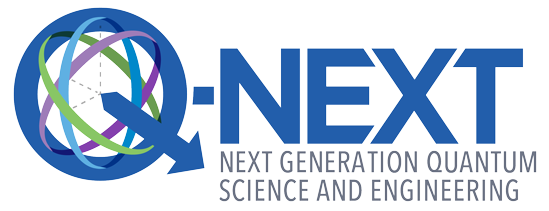In the News
-
U of C to develop quantum supercomputer with Google, IBM and University of Tokyo
From the Chicago Tribune: The University of Chicago has formed a partnership with Google, IBM and the University of Tokyo to develop a supercomputer powered by quantum technology. IBM pledged $100 million toward the project, and Google is to spend $50 million, on technology that could transform computing and information networks. Quantum computing, which is in its infancy, potentially could solve complex problems quickly, beyond the ability of conventional computing. Read More
-
University of Chicago gets quantum tech funding from IBM, Google
From Bloomberg: The University of Chicago will partner with IBM and Google in deals totaling as much as $150 million aimed toward the development of quantum computing. IBM’s vision centers on a quantum-centric supercomputer. The company will develop blueprints with the University of Chicago and the University of Tokyo over 10 years in a plan valued at $100 million. The partnership between the universities and Google will invest as much as $50 million toward accelerating the creation of a fault-tolerant quantum computer and developing the quantum workforce over 10 years. Read More
-
University of Chicago joins global partnerships to advance quantum computing
From the University of Chicago: On May 21, alongside world leaders at the G7 Summit in Japan, the University of Chicago formalized groundbreaking agreements with industry and university partners to transform the future of quantum technology. The first is a 10-year, $100 million plan with IBM, the University of Chicago and the University of Tokyo to develop the blueprints for building a quantum-centric supercomputer powered by 100,000 qubits. The second is a strategic partnership between the University of Chicago, the University of Tokyo and Google, with Google investing up to $50 million over 10 years, to accelerate the development of a fault-tolerant quantum computer and to help train the quantum workforce of the future. Read More
-
Google, IBM validate U of C's quantum ambitions
From Crain's Chicago Business: The University of Chicago will get a major boost in funding and credibility as one of the leaders in the next frontier of computing, known as quantum, after attracting $150 million from IBM and Google for a research partnership with the University of Tokyo. Read More
-
IBM, Google give $150 Million for U.S.-Japan quantum-computing push as China looms
From the Wall Street Journal: IBM and Google are giving $150 million for quantum computing research at the University of Chicago and the University of Tokyo. IBM will give $100 million to the two universities with the aim of building a quantum-centric supercomputer in a decade that contains 100,000 qubits. Google is contributing $50 million to the two universities — the first time the company would share its quantum computer with university scientists as part of a long-term research partnership. Read More
-
The United States and Republic of Korea sign joint statement to boost quantum cooperation
From quantum.gov: On April 25, the United States and Republic of Korea signed a joint statement of cooperation in quantum information science and technology in Washington, DC. The signing took place as part of a broader state visit between ROK President Yoon Suk Yeol and U.S. President Joe Biden. Read More
-
Inaugural US-Switzerland Quantum Symposium sparks international cooperation on critical technologies
From the University of Chicago: Leaders in quantum science from the United States and Switzerland gathered in the Swiss town of Arlesheim for the first-ever Quantum Symposium. The two-day event featured several presentations by Q-NEXT collaborators David Awschalom, Giulia Galli, Supratik Guha and Peter Maurer. Read More
-
Quantum navigation and other aviation use cases with Boeing
From the Post-Quantum World podcast: Boeing has a large team dedicated to using quantum computing and sensing to ensure innovation in aeronautics, ranging from materials science to navigation and other use cases. Join Host Konstantinos Karagiannis for an uplifting chat with Jay Lowell from Boeing. Read More
-
HRL Laboratories silicon encoded spin qubits achieve universality
From HRL Laboratories: HRL Laboratories, LLC, has published the first demonstration of universal control of encoded spin qubits. This newly emerging approach to quantum computation uses a novel silicon-based qubit device architecture to trap single electrons in quantum dots. Read More
-
Exploring the real science behind 'Ant Man'
From Fox 32 Chicago: David Awschalom walks through the real science behind “Ant-Man and the Wasp: Quantumania” in this 4-minute segment. Read More
News and features
See all news and features-
Design rules and synthesis of quantum memory candidates
From the University of Illinois Urbana-Champaign: Researchers use density functional theory calculations to identify possible europium compounds to serve as a new quantum memory platform. They also synthesize one of the predicted compounds, a brand new, air-stable material that is a strong candidate for use… Read More
-
‘Ruler for light’ could enable detailed measurement in personal devices
Frequency combs have revolutionized precision measurement, but the bulky, power-hungry devices are limited to lab settings. A new efficient laser “microcomb” developed by Stanford researchers could bring that revolution to the handheld electronics realm. Read More
-
Resurrecting niobium for quantum science
For years, niobium was considered an underperformer when it came to superconducting qubits. Now scientists supported by Q-NEXT have found a way to engineer a high-performing niobium-based qubit and so take advantage of niobium’s superior qualities. Read More
-
Researchers from startups, government labs and academia develop new techniques for making qubits out of erbium
Argonne project addresses quantum technology challenges and highlight sthe versatility of a rare-earth metal used in lasers and to color glass. Read More
-
Meet Edward Schmitt, facilities engineer
Former Marine Corps electronics technician Edward Schmitt keeps the Argonne Quantum Foundry running while advocating for veterans. Read More
